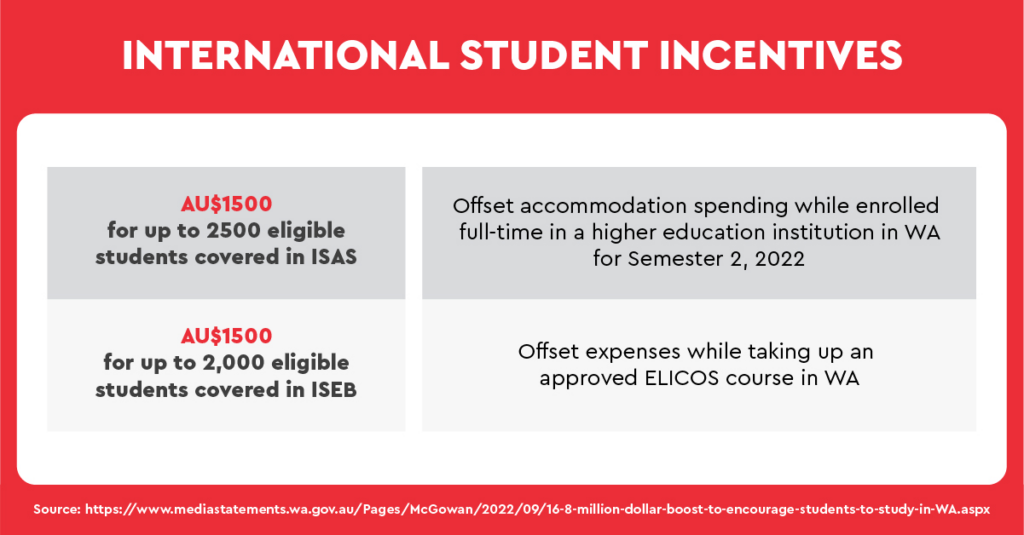In its proactive approach to bouncing back from the pandemic-induced drops in the number of international students, the government of Western Australia (WA) has allotted AU$10 million for an Agent Incentive Scheme.
As a witness to how dedicated education agents are in helping foreign students in their overseas studies, I see this as a welcome development. It is nice to see governments of the top study abroad destinations intervening in helping the sector rise more potent from the dropping numbers in international education enrolments in the past two years.
KEY TAKEAWAYS:
- There is AU$41.2 million worth of the budget that the McGowan government has reserved in its 2022/23 state budget for the international education sector
- Out of the AU$41.2 million, AU$10 million is allocated to the Agent Incentive Scheme
- In the scheme, agents will be paid AU$500 per student placement in schools, ELICOS, or VET providers
- For successful enrolments in universities, AU$1000 will be given to agents
In this article, we will further discuss the Agent Incentive Scheme, the overall education budget set for foreign learners, and the current state of international education in WA. We will also analyze the potential positive impact of the Agent Incentive Scheme.

The Agent Incentive Scheme
On Sept. 14, 2022, the government website of WA released a media statement saying that there will be a AU$16.8-million budget set to boost efforts in attracting more students to enroll at WA schools, colleges, and universities. Out of this budget to support international education initiatives, AU$10 million was allocated to the Agent Incentive Scheme.
On a granular level, the Agent Incentive Scheme will grant an education agent AU$500 per international student for a confirmed enrolment in a school, English Language Intensive Courses for Overseas Students (ELICOS), or Vocational Education and Training (VET) provider. Meanwhile, AU$1,000 will be given to student recruitment agents per international student for a confirmed enrolment at one of the five WA universities.

As a soft power, it is only understandable for countries and states to grant such a generous budget allocation for the international education sector. What’s rare and unique about WA’s monetary decision, as an ICEF Monitor article pointed out, is the intervention in on-the-ground recruitment of students. Through an Agent Incentive Scheme, education agents will be rewarded for ensuring that their recruitment and end-to-end student assistance will be successful.
As most of us in the global education ecosystem are aware, student recruitment agents are critical in the journey of international students. They go above and beyond to ensure that deserving learners have a hand to hold as they venture into an exciting and life-changing experience of studying abroad. That is why I find WA’s Agent Incentive Scheme an effective measure in strengthening support for global education.
I also believe that the Agent Incentive Scheme can be a model for other governments that are also banking on international education as a major contributor to a post-pandemic economic recovery.
WA State Budget for International Education
The overall 2022-23 budget that the McGowan Government announced in May for global education programs is AU$41.2 million. Part of doubling down the efforts in attracting more international students to WA is further funding of AU$6.8 million for sustaining the International Student Accommodation Subsidy (ISAS) and International ELICOS Bursary (ISEB).
The International Student Incentives, according to the WA media statement, will provide one-off payments for ISAS and ISEB. For ISAS, there will be AU$1500 for up to 2500 eligible students to help them offset accommodation spending while enrolled full-time in a higher education institution in WA for Semester 2, 2022. Meanwhile, ISEB will also have AU$1500 for up to 2,000 eligible international students to offset expenses while taking up an approved ELICOS course in WA.

On a larger scale, this kind of support for international students will also help potential foreign students gain more confidence in their study abroad journey.
I am positive that these agent and overseas-student incentives are effective in WA’s recovery, not only in the international education sector but also to the state’s economy. While we see international students as courageous for taking such a bold step in their academic career, leaving home and starting a new chapter in a foreign land still can be daunting.
Having a destination country that offers them assistance be it financially or in whatever shape, form, or size will surely provide some reprieve and help them focus better on the more rewarding aspects of their international academic experience. (SUNEETHA QURESHI)

SUNEETHA QURESHI
MSM President
Suneetha has worked for over 15 years in the international education sector and 25 years overall for her work for other industries. As president of MSM, she fortifies its business development outreach globally, particularly in the face of MSM’s foray into edtech-based recruitment via MSM Unify. She preserves the premium, value-adding services provided to each MSM partner institute, including dedicated teams on the ground, agent management, lead generation and inquiry management, application prescreening, and student and parent support through pioneering pre-departure briefing sessions.
She has an impeccable track record of successfully launching the representative offices in Asia and Africa of many North American and European higher education institutions. Her key strengths include hiring, training, and developing teams as evidenced by the successful results of the dedicated in-country college and university client teams.
Suneetha also has taken the lead in developing several initiatives at MSM, including building robust standard operating procedures, the Rise ‘n Shine team engagement platform, and the organization’s data analytics and AU$it segments.

